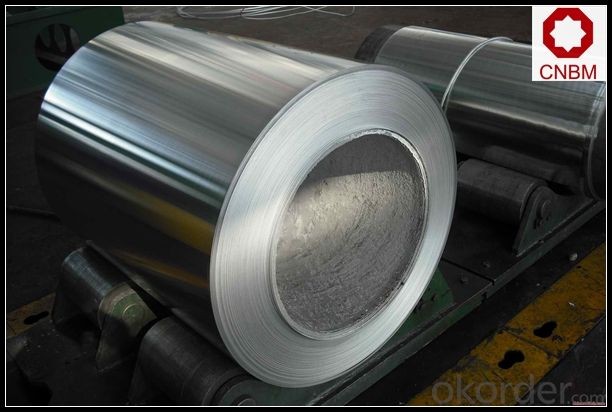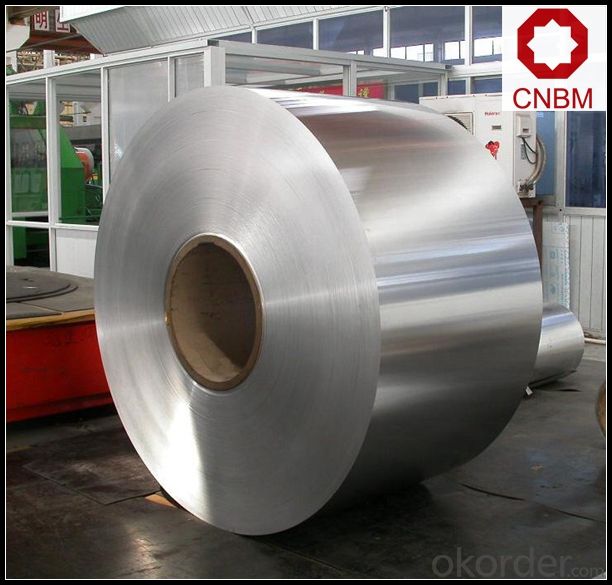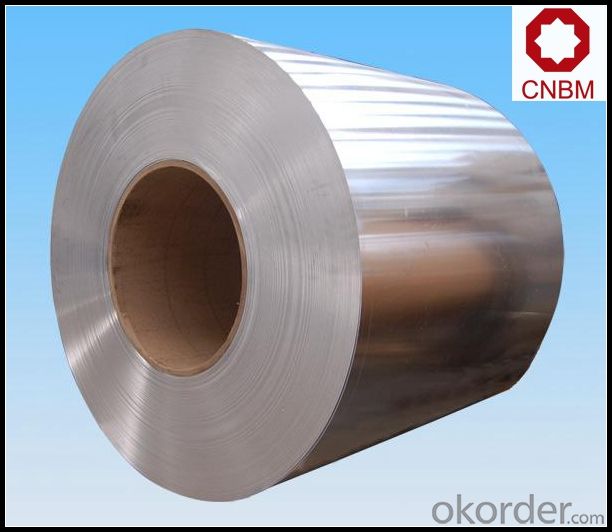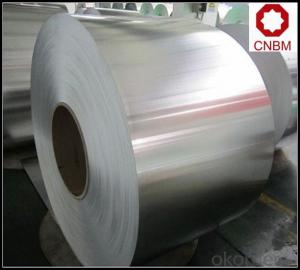DC and CC Mill Finish Aluminium Coil 1/3/5/6/8 Series
- Loading Port:
- Shanghai
- Payment Terms:
- TT OR LC
- Min Order Qty:
- 5 m.t.
- Supply Capability:
- 10000 m.t./month
OKorder Service Pledge
OKorder Financial Service
You Might Also Like
Item specifice
1. Specification of DC and CC Mill Finish Aluminium Coil 1/3/5/6/8 Series
Alloy: 1050, 1060, 1100, 3003, 3004, 3005, 3105, 5005, 5052, 5083, 5754
2) Temper: Various status
3) Thickness: 0.3-150mm
4) Width: 300-1950mm
5) Length: Under9500mm/ Coil
6) Weight: 2.5-5.0 tons per coil
7) Dimensions and weight can be produced according to clients' specifications.
8) Inner Diameter: 505mm, 605mm
9) Packing: Export standard, wooden pallet.
10) Delivery time: 20 days
11) Minimum order quantity: 5 tons per size.
12) The term of payment: T/T, irrevocable L/C at sight.
13) Surface: Bright
14)Origin: China
2. Application of DC and CC Mill Finish Aluminium Coil 1/3/5/6/8 Series
(1).Interior: wall cladding, ceilings, bathrooms, kitchens and balconies, shutters, doors...
(2).Exterior: wall cladding, facades, roofing, canopies, tunnels,column covers , renovations...
(3).Advertisement: display platforms, signboards, fascia, shop fronts...
3. Feature of DC and CC Mill Finish Aluminium Coil 1/3/5/6/8 Series
*Such coil is specially designed to replace aluminum ingot, due to the high export tax of aluminum ingot, the coil has better price than ingot.
*This type of coil can fit customer's remelting furnace just like ingot, no need to make any change to the production line that was previously used for ingot. The standard coil size and weight is very suitable for the feed gate of furnace.
*This type of coil causes less material wastage than ingot when remelted.
*Our coil is made directly from ore, no need to go though the ingot making process, quality is much better than other suppliers who use ingot scrap to make coil.
Be free from Oil Stain, Dent, Inclusion, Scratches, Stain, Oxide Dicoloration, Breaks, Corrosion, Roll Marks, Dirt Streaks and other defect which will interfere with use
4. Certificate:
SGS and ROHS(if client request, paid by client), MTC(plant provided), Certificate of Origin(FORM A, FORM E, CO), Bureau Veritas and SGS (if client request, paid by client), CIQS certificate
5. Image of DC and CC Mill Finish Aluminium Coil 1/3/5/6/8 Series



6. Package and shipping of DC and CC Mill Finish Aluminium Coil 1/3/5/6/8 Series
eye to wall
eye to the wall
with wood pallet (wooded case also available)
7. FAQ
1) What is the delivery time?
Dpends on actual order, around 20 to 35 days
2)What is the QC system:
We have QC staff of 20 persons and advanced equipment, each production is with MTC traced from Aluminum ingot lot.
3) What market do you mainly sell to?
Australia, America, Asia, Middle East, Western Europe, Africa etc
- Q:What are cold rolling aluminum coil and hot rolling aluminum coil? What are their features?
- If the rolling temperature is above the crystallization one, it is hot rolling, otherwise it is cold rolling.
- Q:Can aluminum coils be used in signage applications?
- Indeed, signage applications can make use of aluminum coils. The durability, corrosion resistance, and lightweight characteristics of aluminum render it a favored material for signage purposes. Aluminum can effortlessly take on different shapes and sizes, making it suitable for a wide range of signage types, including outdoor signs, billboards, trade show displays, and more. Furthermore, aluminum coils boast exceptional weather resistance, guaranteeing the preservation of the signage's integrity and vibrancy even in harsh environmental circumstances. The versatility and longevity of aluminum establish it as the preferred option for signage applications across diverse industries.
- Q:I wrap everything with aluminum foil and bake it in the oven -- fish, meat, vegetables. Is this really safe? Or safe when done occasionally? Or should I find a new way?
- Perfectly safe to use aluminum foil in the oven..........NOT so much in the microwave, lol. :)
- Q:How much can i get for a gallon filled with aluminum Tabs from cans
- Aluminum is not sold by the gallon, it is sold by the pound, so you need to weigh what you have to determine what it is worth. Aluminum is not expensive, so the price you can expect is around 30 to 60 cents per pound.. Contact local recycling centers near you to find out what the going rate for is in your area.
- Q:Can aluminum coils be used in aerospace heat exchangers?
- Yes, aluminum coils can be used in aerospace heat exchangers. Aluminum is widely used in aerospace applications due to its lightweight and excellent heat transfer properties. It offers good corrosion resistance, high thermal conductivity, and is cost-effective, making it a suitable material for heat exchangers used in aircraft and other aerospace systems.
- Q:Can aluminum coils be used in food processing industries?
- Yes, aluminum coils can be used in food processing industries. Aluminum is non-toxic, lightweight, and has excellent conductivity, making it suitable for various applications in the food industry. It is commonly used in food packaging, cooking utensils, and equipment, including heat exchangers and refrigeration units. Additionally, aluminum coils are corrosion-resistant and easy to clean, making them a safe and hygienic choice for food processing.
- Q:What are the different edge profiles available for aluminum coils?
- Aluminum coils offer various edge profiles to cater to specific needs and preferences. The options include: 1. Square Edge: This simple profile has sharp corners and a flat surface, often used in functional industrial applications. 2. Round Edge: With a curved surface that eliminates sharp corners, this profile ensures safety and is commonly used in automotive and playground equipment. 3. Beveled Edge: This profile boasts a sleek and modern look with its slanted or angled surface, making it popular for architectural purposes and reducing the risk of injuries. 4. Full Radius Edge: Featuring a smooth, rounded surface along the entire coil length, this profile minimizes the risk of damage or scratching when in contact with other materials. 5. Hemmed Edge: By folding the edge back onto itself, this profile creates a double layer of metal, providing a strong and durable edge for appliances and cabinets. 6. Tapered Edge: Gradually narrowing the coil's width towards the edge, this profile adds visual interest and a dynamic appearance, often chosen for architectural or decorative purposes. It's important to consider that the availability of these edge profiles may vary among manufacturers and depend on the intended application. Consulting with the supplier or manufacturer is recommended to determine the specific edge profiles available for a particular coil.
- Q:What's the difference between an aluminum alloy strip and an aluminum coil?
- The specifications are different. Generally speaking, the aluminum strips are of small size, and the aluminum rolls are of large size
- Q:Can aluminum coils be used in water treatment plants?
- Aluminum coils have a wide range of applications in water treatment plants due to their corrosion resistance and efficiency in heat transfer. They are commonly used in heat exchangers and condensers for optimal heat transfer. In water treatment plants, aluminum coils serve various purposes. For instance, they are utilized in cooling towers to effectively remove heat from water by circulating it over the coils. This process facilitates the transfer of heat from the water to the surrounding air, resulting in the cooling of the water. Moreover, aluminum coils are also employed in the construction of evaporators, which aid in the evaporation of water during the treatment process. These coils are designed to have a large surface area, maximizing contact between the water and the aluminum surface to enhance evaporation efficiency. Additionally, aluminum coils play a crucial role in air handling units (AHUs) within water treatment plants. AHUs help regulate temperature, humidity, and air quality in the facility. The aluminum coils in AHUs contribute to the overall efficiency of the system by cooling or heating the air passing through them. However, it is important to consider the compatibility of aluminum with the specific water being treated. Certain water compositions, such as those with low pH or high levels of certain chemicals, can cause corrosion or chemical reactions that may affect the performance and durability of aluminum coils. Therefore, it is essential to assess the water composition and seek guidance from experts or manufacturers to ensure the suitability of aluminum coils for a particular water treatment application.
- Q:What are the potential risks of using aluminum coils in specific applications?
- There are several potential risks associated with using aluminum coils in specific applications. Firstly, aluminum is a highly reactive metal and can undergo oxidation, leading to the formation of aluminum oxide. This oxide layer can be protective in some cases, but in certain environments, such as acidic or alkaline conditions, it can break down and result in corrosion of the aluminum coils. This corrosion can compromise the structural integrity of the coils and reduce their lifespan. Secondly, aluminum coils have relatively low strength compared to other metals, such as steel. This can make them susceptible to deformation or damage under heavy loads or high pressure conditions. In applications where the coils are exposed to significant mechanical stress, they may be more prone to bending or cracking, leading to potential failure. Furthermore, aluminum has a relatively low melting point compared to other metals, such as copper or iron. This means that in applications where the coils are subjected to high temperatures, such as in heating or cooling systems, there is a risk of the aluminum coils melting or deforming. This can result in system malfunctions, reduced efficiency, or even safety hazards. Another potential risk of using aluminum coils is related to their electrical conductivity. While aluminum is a good conductor of electricity, it has a higher resistance compared to copper. This can lead to increased power losses and reduced energy efficiency in electrical applications. Additionally, aluminum coils may also be more prone to electrical arcing or sparking, which can pose a fire hazard. Finally, it is worth mentioning that aluminum is a lightweight metal, which can be advantageous in certain applications. However, this also means that aluminum coils may have lower durability and resistance to physical impacts or external forces compared to heavier metals. In environments where the coils are exposed to vibrations, impacts, or other mechanical stresses, they may be more susceptible to damage or premature failure. Overall, while aluminum coils offer various benefits, including light weight, good thermal conductivity, and resistance to corrosion, it is important to carefully consider the potential risks associated with their use in specific applications. Proper design, maintenance, and compatibility with the operating conditions are crucial to mitigate these risks and ensure the safe and effective performance of aluminum coils.
1. Manufacturer Overview |
|
|---|---|
| Location | |
| Year Established | |
| Annual Output Value | |
| Main Markets | |
| Company Certifications | |
2. Manufacturer Certificates |
|
|---|---|
| a) Certification Name | |
| Range | |
| Reference | |
| Validity Period | |
3. Manufacturer Capability |
|
|---|---|
| a)Trade Capacity | |
| Nearest Port | |
| Export Percentage | |
| No.of Employees in Trade Department | |
| Language Spoken: | |
| b)Factory Information | |
| Factory Size: | |
| No. of Production Lines | |
| Contract Manufacturing | |
| Product Price Range | |
Send your message to us
DC and CC Mill Finish Aluminium Coil 1/3/5/6/8 Series
- Loading Port:
- Shanghai
- Payment Terms:
- TT OR LC
- Min Order Qty:
- 5 m.t.
- Supply Capability:
- 10000 m.t./month
OKorder Service Pledge
OKorder Financial Service
Similar products
New products
Hot products
Hot Searches
Related keywords




























